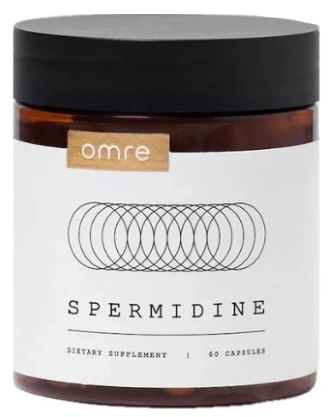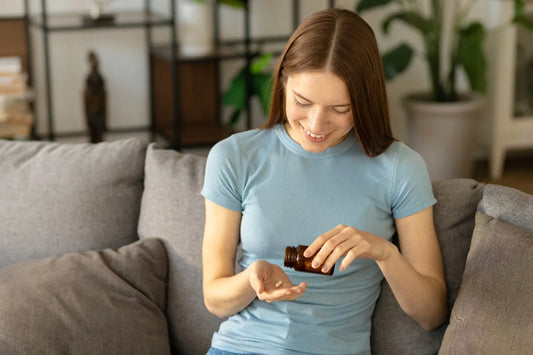Table of Contents
David Sinclair, a world-renowned aging researcher, has gained attention for his approach to slowing down the aging process.
A big part of his daily routine includes spermidine, a compound believed to promote cellular cleanup and renewal.
But how much does he take—and could it make a difference for you?
We’ll break down Sinclair’s spermidine dosage, explore its potential benefits, and take a closer look at the other supplements he swears by for longevity.
Spermidine
Cellular autophagy activator, providing a potent and highly purified dose of Spermidine.*
What Is Spermidine?-v1736285964533.webp)
-v1736285964533.webp)
Spermidine is a naturally occurring compound found in foods like wheat germ, aged cheese, and mushrooms. It is known for triggering autophagy, a process where cells clean out damaged components to stay healthy.
This cellular cleanup process is often compared to “spring cleaning” for your body, and it may play a key role in slowing down aging. Researchers believe spermidine could support cardiovascular health, improve metabolism, and even protect brain function.
While most studies so far have been done in animals or small lab settings, early findings are promising.
Scientists are eager to learn more about how spermidine might benefit humans—especially when it comes to longevity and healthy aging.
How Much Spermidine Does David Sinclair Take?
-v1736286400637.webp) David Sinclair reportedly takes 1 mg of spermidine per day as part of his morning supplement routine. He believes this timing works well with his body’s natural rhythms and enhances its effectiveness.
David Sinclair reportedly takes 1 mg of spermidine per day as part of his morning supplement routine. He believes this timing works well with his body’s natural rhythms and enhances its effectiveness.
Sinclair pairs spermidine with other longevity-focused supplements like NMN and resveratrol, creating a combined effect that targets cellular health and energy production.
Taking spermidine in the morning may also align with autophagy cycles, which are naturally more active during the day.
Although 1 mg is a commonly recommended dose, some people take higher amounts—closer to 10 mg—depending on their health goals. Sinclair’s approach reflects his belief in consistency and moderation, making it easier to stick with his plan over time.
Other Supplements in David Sinclair’s Anti-Aging Routine
Sinclair’s daily routine includes several supplements aimed at supporting longevity and cellular health. Here’s a quick look at what he takes:
- Nicotinamide Mononucleotide (NMN) – 1g per day: NMN supports NAD+ production, which fuels energy, DNA repair, and mitochondrial function (1). Early studies suggest it may improve insulin sensitivity and physical performance as we age (2).
- Resveratrol – 1g per day: Resveratrol is believed to activate sirtuins—proteins associated with longevity—and may reduce inflammation while supporting heart health (3). Sinclair mixes it with yogurt to improve absorption.
- Metformin – 800mg per day: Metformin may mimic the effects of calorie restriction, improving insulin sensitivity and lowering inflammation (4). Sinclair takes it in the evening but skips doses on workout days to avoid stressing mitochondria.
- Vitamin D3 – 4,000–5,000 IU per day: Vitamin D3 supports immune health, bone strength, and mood regulation (5). Sinclair pairs it with vitamin K2 to enhance calcium absorption and prevent buildup in arteries.
- Trimethylglycine (TMG) – 500–1,000 mg per day: TMG helps balance methyl groups that may be depleted by NAD+ production. It may also support liver health, cardiovascular function, and cellular repair (6).
- Quercetin and Fisetin – 500 mg each per day: These compounds are classified as senolytics, which may help clear damaged cells and reduce inflammation. Early studies in animals suggest they could promote healthier aging (7, 8).
- Vitamin K2 – 180–360 mcg per day: Vitamin K2 works alongside D3 to direct calcium into bones and away from arteries. It may help maintain bone strength and lower the risk of cardiovascular issues (9).
The Science Behind Spermidine’s Anti-Aging Effects
Spermidine has sparked interest in the scientific community because it may help cells repair and renew themselves through autophagy. This process is often described as “cellular recycling” and is believed to protect against age-related decline.
Animal studies suggest that spermidine might improve heart health, extend lifespan, and protect brain cells from damage. For example, one study found that mice given spermidine lived longer and had better heart function compared to those that didn’t receive it (10).
Another small study suggested that spermidine might help preserve memory and cognitive function by protecting neurons.
Researchers believe this could make it a potential ally against conditions like Alzheimer’s, although more human trials are needed to confirm these effects (11).
While early research is promising, it’s worth noting that most studies so far have been done in animals or test tubes. Scientists are still working to understand how these findings translate to humans.
Other Health Benefits of Spermidine
Early studies hint that spermidine might support various aspects of health, but more human research is needed to know for sure. Here’s a look at what it may help with:
- Cardiovascular Health: Studies have found that spermidine may help lower blood pressure and reduce inflammation, both of which are linked to heart health. Some research also suggests it could lower the risk of heart failure by improving cellular function in the cardiovascular system (12). Although, it’s not proven humans yet.
- Neuroprotection: Studies have shown that spermidine might protect against neurodegeneration and support long-term brain health by preserving neurons. Animal research suggests it may enhance memory and cognitive function, but human trials are still ongoing (13).
- Skin, Hair, and Nails: Early studies and anecdotal evidence indicate that spermidine may improve skin texture, promote shinier hair, and strengthen nails (14).
- Inflammation Reduction: Research suggests that spermidine may reduce inflammation by regulating cytokines—proteins involved in the immune response (15).
- Metabolism Support: Preliminary studies indicate that spermidine might improve the body’s ability to process energy and regulate metabolism. Researchers also believe it may indirectly support weight management through its role in cellular renewal (16).
- Cellular Regeneration: Studies have found that spermidine may promote cell repair and regeneration in muscles and organs (17).
Spermidine
Cellular autophagy activator, providing a potent and highly purified dose of Spermidine.*
Should You Take Spermidine?
Spermidine has shown promise as a supplement that supports cellular renewal and healthy aging, but it’s not a one-size-fits-all solution. While early studies are encouraging, more human research is needed to confirm its long-term benefits.
If you’re considering adding spermidine to your routine, think about your health goals and current lifestyle. It might be a good fit if you’re focused on supporting longevity, brain health, or cellular repair.
That said, it’s always a good idea to check with your doctor before starting any new supplement—especially if you have existing health conditions or take medications.
Questions to ask yourself:
Are you looking to support healthy aging and cellular renewal?
Do you have specific goals like improving heart health, brain function, or metabolism?
Are you following a healthy diet and lifestyle but want extra support for cellular repair?
Have you discussed supplements with your doctor to rule out potential interactions?
How to Incorporate Spermidine Into Your Routine
Spermidine is naturally found in foods like wheat germ, aged cheese, mushrooms, soybeans, and legumes. While adding these to your diet can provide small amounts of spermidine, it’s often hard to get consistent doses through food alone—especially if you’re aiming for levels studied in research.
That’s where supplements come in. Spermidine supplements are a more reliable way to get higher doses, and they’re available in two common forms—natural extracts (typically from wheat germ) and synthetic versions like spermidine trihydrochloride.
Many prefer natural sources, as they often provide better absorption and fewer additives.
When picking a spermidine supplement, look for products with clearly labeled dosages, third-party testing, and natural sources. It’s also worth considering formulas that combine spermidine with complementary ingredients for better results.
Omre’s Spermidine is a standout option for those looking for purity and potency. It delivers 10 mg of natural spermidine sourced from 1,000 mg of wheat germ extract—a high-strength dose backed by research.
Unlike synthetic alternatives, it provides a clean, natural formula with no fillers.
Omre’s formula is ultra-pure, third-party tested, and designed for maximum absorption, making it an excellent choice for supporting cellular rejuvenation.
With doctor-developed formulas and properly dosed ingredients, it focuses on delivering measurable results.
Conclusion
Spermidine is gaining attention for its potential to promote cellular repair, support heart health, and protect brain function. While more human research is needed, early studies and anecdotal reports suggest it could be a valuable tool for healthy aging.
David Sinclair’s approach to longevity highlights the importance of consistency and pairing spermidine with other well-researched supplements.
Whether you’re looking to support cellular renewal or simply stay ahead of aging, spermidine might be worth exploring.
For those looking for a high-quality option, Omre’s Spermidine offers a potent, natural formula with 10 mg of spermidine per serving. It’s third-party tested and designed for maximum impact. 
Check availability to learn more about adding Omre Spermidine to your routine today!





